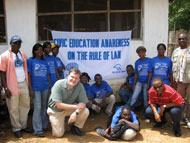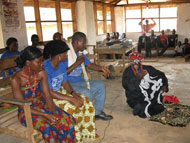From its inception, the Access to Justice Project has prioritized educating citizens about the law and their fundamental rights. This increases access and improves accountability. In addition, studies show that as a community’s legal knowledge increases, conflict levels decrease.
Since 2006, The Carter Center worked with the Ministry of Justice and multiple civil society organizations to provide rural citizens with information about rights and responsibilities related to their daily lives. These partners developed community dramas about issues such as criminal procedure, land ownership, the revised rape law, women’s inheritance and property rights, the roles and responsibilities of different local justice actors –including magistrates, judges, and customary chiefs – and means to resolve disputes peacefully.
This community-level outreach is coupled with extensive educational programming on national and local radio. The Center has supported a number of national radio programs, including a “Rule of Law Radio Hour,” a “County Attorney Half-Hour,” “Access to Justice,” “Crime Watch,” along with multiple call-in shows with local justice officials.
As the original civic educators worked in rural communities, they were asked by citizens to adjudicate cases. This led The Carter Center to develop a Community Legal Advisors program – subsequently renamed the Community Justice Advisors (CJA) program – in partnership with the Catholic Justice and Peace Commission.
With technical support and funding through The Carter Center, CJAs provide civic education, voluntary mediation, and case-specific information. They accompany clients through legal processes and monitor the courts, prisons, and local policy. CJAs forge relationships with magistrates, police, and traditional chiefs to help ensure that justice issues are handled by the appropriate authorities.
Since 2008, CJAs have handled over 13,000 cases and currently work in eight counties, serving 470 communities. The majority of their clients are women, and a large percentage of their cases involve child support.
As in many countries, women in Liberia have often been treated as second-class citizens, both in practice and under the law.
When The Carter Center first started talking to citizens about legal concerns, they raised many issues related to women, including domestic violence, rape, inheritance, property rights, and child support. To help address these and other concerns, the Center began holding training sessions for men and women. These trainings adopted a “whole community” approach, describing how all – not just women – benefit from improved conditions for women and girls. In the long term, this approach has shown significant success in increasing women’s access to justice, including usage of the community justice advisors and participation in community decision-making.
In 2012, in response to requests from women leaders, The Carter Center also began to train women separately from men. Women told Center staff that while they welcomed the chance to interact on a common footing with the male chiefs and elders, they also wanted space to discuss issues that they could not talk about freely with the men. This combined approach continues today.
During the war, rape was a constant threat, and sexual violence continues to be a problem in Liberia. Because the criminal justice system is weak and plagued by corruption, and because families and community leaders often intervene to “resolve” cases of sexual violence, many rapists are never punished.
The Carter Center played an important role in encouraging chiefs to publicly commit themselves to combating rape and agreeing to turn cases over to the courts, which they did following a public meeting co-convened by the Ministry of Internal Affairs, the National Council of Chiefs and Elders, the United Nations Mission in Liberia and The Carter Center.
Please sign up below for important news about the work of The Carter Center and special event invitations.
 (Click to enlarge)
(Click to enlarge)
Carter Center staff, including those pictured above, have worked throughout Liberia since 2006 on the rule of law project.
 (Click to enlarge)
(Click to enlarge)
Through drama, people learn about how law relates to their traditional practices. Here the local Sassywood man (or spiritual healer) shows how he can tell guilt and innocence by using shells in the traditional way.
"Important changes of attitudes toward women are taking place in traditional areas, in part due to the awareness raising of The Carter Center, including women playing a more active role in community mediation." – Swedish International Development Cooperation Agency evaluation, 2015